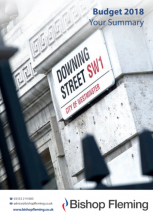Budget 2018 – Impact on Academies
Partner and Head of Academies, Pam Tuckett, takes a look at how the Autumn Budget 2018 affects academies.
It was easy to miss any measures in the Budget for schools as there was little announced other than an extra in-year capital funding bonus of £400 million “to help our schools buy the little extras they need,” in the Chancellor’s words.
He added that this amounts to an average £10,000 for a primary school or £50,000 for a secondary school, if one could use such an average for any school.
With last year’s National Audit Office report stating that £6.7 billion in capital expenditure was needed to bring all school buildings up to a satisfactory standard, this extra £400 million is very small change indeed, and it only takes the Department for Education’s total capital budget for this year from £5.2 billion to £5.6 billion.
Not only that, but ahead of next year’s Spending Review, the Department’s capital budget is planned to drop over the next two years to only £4.5 billion in 2020-21.
Clearly, the Chancellor needs to read our Academies Benchmark Report to see the state of the sector.
The Chair of the Public Accounts Committee, Meg Hillier MP, issued her response to the extra funding, saying:
“The Public Accounts Committee has extensively documented the financial challenges facing critical public services such as schools, the NHS and social care. In this context the announcement of funding for ‘little extras’ for schools was an insult to pupils and parents. With schools living through a £3 billion reduction in funding in England – unable to afford to pay for staff, and considering short weeks and a reduced curriculum to balance the books – this is simply a kick in the teeth.”
I said in my Pre-Budget commentary that I wanted to see fairer funding across all income streams for schools. And in particular I said that funding should go directly to schools rather than local authorities that tend to keep a slice for themselves. This is what the government has proposed from 2020, though it did not appear to be confirmed in the Budget.
With the Spending Review taking place next year, money going directly to schools has to be part of the plan, and it needs to be much fairer.
High Needs funding also has to change, and again this was not addressed in the Budget.
So, whilst we continue to wait for a clearer indication that more money will be made available, one area that continues to drive efficiencies for Multi Academy Trusts (MATs) is to fully centralise, including core operations such as school improvement and provision of supply staff across the Trust. Not so easy of course for a single academy to find such savings.
The lack of funding and the extra wait for the spending review could possibly drive more single academies to join a MAT before they hit financial problems.
There is a major resource crisis in schools at the moment and any major new funding, like there has been promised for the NHS, appears to be too far in the distance.
Reducing the burden on teachers
A post Budget announcement that will be welcomed by teachers is a government initiative to simplify the administrative function.
As I pointed out in my Pre-Budget commentary, the government needed to simplify the administrative process just as it had done for things like renewing your car tax disc.
The government has now committed to:
- only asking for pupil attainment data if a school is at risk of failure, above that which is collected for national assessments, if a school is failing;
- requesting data in a school’s existing format, where possible, to avoid duplication;
- stopping the introduction of resits for year 7 pupils, which would have generated extra workload for teachers;
- providing practical tools for schools to manage pupil data more effectively, including guidance on how to log incidents of poor behaviour in a simpler way, which the report found can be very burdensome for teachers; and
- giving guidance to head teachers on how to conduct teacher appraisals and the use of pupil targets and attainment data.





